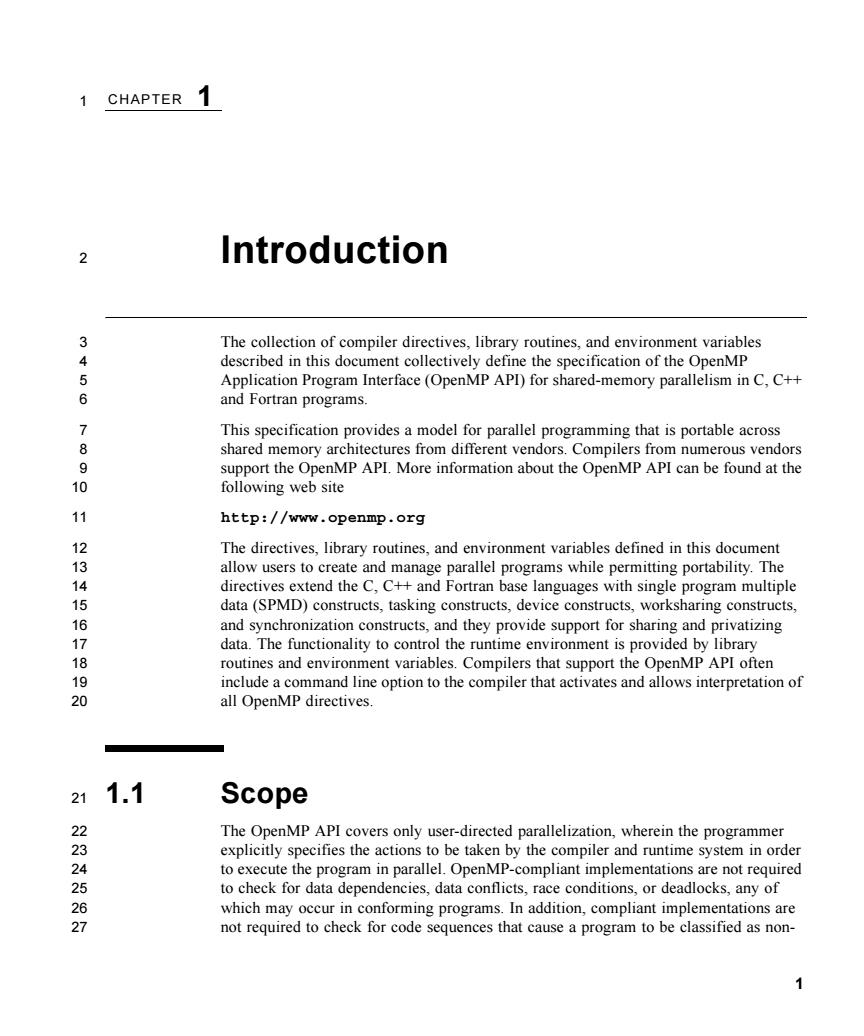正在加载图片...

1 CHAPTER 1 Introduction yroutines,and environment variables 5 一cmeree8 AP)formyC.士 the specification of the OpenMP and Fortran programs. This providesamodel for paralle that is 89 shared n 10 following web site 11 http://www.openmp.org The directives,library routines,and environment variables defined in this document 13 allow users to create and manage parallel programs while permitting portability.The directives extend the C,C++and Fortran base languages with single program multiple 6 data(SPMD)constructs,tasking constructs,device constructs,worksharing constructs. 16718 and synchronization constructs,and they provide support for sharing and ivatizing data.The functionality oon rol the runtin e en nvironment is provided ndrbCompiehat support the OpenMPP brary 19 include a command line option to the compiler that activates and allows interpretation of 2 all OpenMP directives. 21 1.1 Scope The OpenMP API covers only user-directed parallelization,wherein the programmer 23 explicitly specifies the actions to be taken by the compiler and runtime system in order to execute the program in parallel.OpenMP-compliant implementations are not required 25 to check for data dependencies,data conflicts.race conditions,or deadlocks,any of which may1 CHAPTER 1 Introduction The collection of compiler directives, library routines, and environment variables described in this document collectively define the specification of the OpenMP Application Program Interface (OpenMP API) for shared-memory parallelism in C, C++ and Fortran programs. This specification provides a model for parallel programming that is portable across shared memory architectures from different vendors. Compilers from numerous vendors support the OpenMP API. More information about the OpenMP API can be found at the following web site http://www.openmp.org The directives, library routines, and environment variables defined in this document allow users to create and manage parallel programs while permitting portability. The directives extend the C, C++ and Fortran base languages with single program multiple data (SPMD) constructs, tasking constructs, device constructs, worksharing constructs, and synchronization constructs, and they provide support for sharing and privatizing data. The functionality to control the runtime environment is provided by library routines and environment variables. Compilers that support the OpenMP API often include a command line option to the compiler that activates and allows interpretation of all OpenMP directives. 1.1 Scope The OpenMP API covers only user-directed parallelization, wherein the programmer explicitly specifies the actions to be taken by the compiler and runtime system in order to execute the program in parallel. OpenMP-compliant implementations are not required to check for data dependencies, data conflicts, race conditions, or deadlocks, any of which may occur in conforming programs. In addition, compliant implementations are not required to check for code sequences that cause a program to be classified as non- 1 2 3 4 5 6 7 8 9 10 11 12 13 14 15 16 17 18 19 20 21 22 23 24 25 26 27